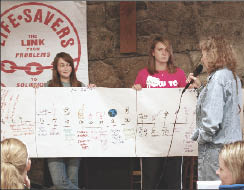 |
|
Life Line: Students in training to be LifeSavers peer counselors discuss a “lifetime timeline.”
Photo: Ted Crail |
Judy Ashby found that after her son committed suicide, she had few places to turn for help and support – and realized that her son had had even fewer. So she created a suicide prevention organization in Carbondale, Ill., following the best model she found: a peer support network in which youths played the roles of listener and problem-solver.
Judging by anecdotes, it’s a model that seems to work. Youths sometimes respond to the intervention of other youths better than to that of adults. But getting a youth-led counseling group started, then training youths to be there for one another, presents significant challenges, from getting school and community support to finding the right kids for a sensitive job.
With adults on the sidelines, youths become more open and comfortable, says Jessica Grimm with the Westchester Community Network’s Youth Forum in Syracuse, N.Y. “It’s reassuring to talk to someone your age who has gone through what you’ve gone through.”
“Often the best advice these kids get is the advice they receive from one another, not the adults,” says Brenda Spurlin, executive director of Toledo Ray, a support group for gay and lesbian teens in northwest Ohio. “I’m amazed at how open and helpful the kids are with one another.”
Recruiting youths
To get started, advises Ashby, who founded LifeSavers Training Corp., be sure to recruit youth counselors from different cliques and walks of life (i.e. jocks, preps, geeks, etc.), so that any youth who needs peer support can find a counselor with whom he or she feels comfortable.
Then create a structure that lets the youths steer the content and direction of meetings, even if they’re not actually running the group. “Young people don’t want another program,” says Grimm from the Youth Forum. “Don’t couch it in those terms or describe it to them as ‘curriculum-based.’ It has to be peer-run and peer-governed.”
Several groups do, however, use young adults who participated as youths, then returned as volunteers. They bring an established rapport with the kids, and in the case of Toledo Ray, some of them are in partner relationships. “These kids often don’t have models for relationships of their own,” Spurlin says.
In the peer support groups run by the Idaho Federation of Families for Children’s Mental Health, the groups’ adult facilitators are often young adults who have aged out of the children’s mental health system. The young peer facilitators act as discussion leaders who encourage participants to talk about the issues of living with mental illness – either their own or that of their family members.
The peer support framework is essential, says the federation’s youth coordinator, Nicole Gustafson. “The kids can be themselves and not feel like they’re being judged.”
Ashby says this setup benefits counselors as well. “The kids find out just how much alike everyone is beneath the layers of ethnicity, race, religion and political orientation,” she says.
Plus, the counselors learn important life skills by helping peers work through crises. “They learn problem-solving skills that will prevent future issues down the road,” Ashby says.
Youth counselors also learn to understand the often unsettling behavior of peers, realizing that kids who act out are not necessarily “bad” but are likely troubled by some underlying issue. “Kids want to talk,” Ashby says. “We teach our peer counselors how a few well-placed questions can bring a student to resolution.”
The challenges of getting started
Peer-supported crisis prevention programs can be a hard sell, particularly if one is trying to work directly in the schools, as LifeSavers does. “Justifying the expense to schools is hard,” Ashby says. “While ours is primarily a suicide prevention program, we try to emphasize that it’s life skills training for the kids who participate in the retreats.”
For Toledo Ray, the biggest issue was finding a place for kids to meet; no local businesses wanted to have anything to do with appearing to support a gay and lesbian support group for teens.
Volunteer turnover is also an issue. Spurlin, Toledo Ray’s founder, says most gays who move to Toledo are there for school or jobs and don’t stay very long, so the organization is constantly on the lookout for gay adults and parents of gays to help provide support.
Getting youths to participate in the meetings was tough at first, too, Spurlin says. The group tried all kinds of unusual recruiting methods, including sticking fliers in library books on gay and lesbian issues. Eventually, Toledo Ray grew as a result of word of mouth. Participants are now recruited mostly by other youths.
Deborah Huso is a freelance writer in Blue Grass, Va. dhuso@youthtoday.org.
Youth Forum Peer Support Organization
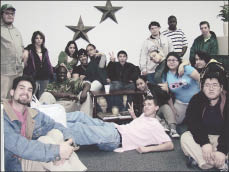 |
|
Blue Plate Special: Youth Forum teens meet three nights a week for dinner and discussion.
Photo: Youth Forum Peer Support Organization |
Westchester Community Network
Westchester, N.Y.
(914) 995-5250
http://www.westchestercommunitynetwork.com
The Strategy: Provide ongoing peer support to young people in the mental health system.
Getting Started: The Youth Forum started in 1993, after the Community Network’s Family Ties program (which offers support to families with children suffering from mental illness) invited youths served by the program to talk about what worked and didn’t work for them in the mental health system. After the youths made a presentation on this subject to Family Ties staff and clients, the young people indicated they would like to continue meeting as a group. The forum was born with the help of a $10,000 Enhanced Family Support Grant from the New York State Coalition for Children’s Mental Health Services.
How It Works: The youths meet on Monday, Wednesday and Friday evenings, generally for two hours and often over dinner, to discuss issues of importance to them. Sometimes the group will invite presenters to talk about such issues as substance abuse, stress, domestic violence, anger management and dream interpretation. The youths suggest topics for meetings, which are run by trained peer facilitators. The facilitators are trained twice a year at a retreat where they learn skills in anger management, public speaking and working with others.
Youth Served: The forum serves 16- to 24-year-olds, focusing mainly on those who are in a transitional stage between child and adult services. All participants are in the mental health system, coming from residential treatment centers, private therapy practices, hospitals and foster care. On a typical evening, about 15 youths participate in the forum. Network Executive Director Myra Alfreds estimates the forum serves 110 youths annually.
Staff: The forum has three support staff members, plus a coordinator. All are part-time and work in other capacities outside the Community Network. For example, one is a probation officer; another is a psychologist.
Money: The forum’s annual budget is $200,000. Most of the funding comes from Family Services of Westchester, a nonprofit agency dedicated to providing support to families who need social and mental health services.
Results: The Network does not have formal, long-term evaluation processes in place.
A decade-old Columbia University study determined that at least 75 percent of young people who had graduated out of the forum were engaging in positive activities, including attending college or being gainfully employed. Alfreds said similar recent studies by the Community Network have shown like results. “We’ve been unexpectedly pleased by that,” she says, “because this program does not have college as a goal.”
LifeSavers Training Corp.
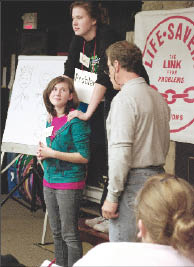 |
|
Adult Help: Students counsel their peers one-on-one, but adults are there to assist.
Photo: Ted Crail |
Carbondale, Ill.
(618) 549-5578
http://www.thelifesavers.net
The Strategy: Prevent teen suicide by offering peer-supported counseling and crisis prevention services.
Getting Started: After the suicide of her 18-year-old son in 1985, Judy Ashby searched for a suicide prevention program to take into her son’s Carbondale Community High School. She discovered the LifeSavers curriculum that had been developed by the staff at Belleville High School in Belleville, Ill., and brought it to Carbondale in 1988.
How It Works: LifeSavers recruits teens who already show an aptitude for helping others or have had past troubles themselves. The teens go through an application process that requires recommendations from teachers and school staff.
Selected teens go through a three-day training session to learn the skills of effective compassion, confidentiality, listening, recognizing signs of depression and recognizing their limits as counselors.
Teen counselors work one-on-one with youths who are having trouble. Their discussions take place informally or in designated “listening rooms” at the schools, where youths can make appointments to speak confidentially with a peer counselor. Adult advisers are available if a counselor feels a youth needs professional intervention.
Youth Served: There are 500 trained LifeSavers peer counselors active in about 20 Illinois and Louisiana high schools. Ashby, the executive director, says there is no way to determine how many youths the program reaches, because the services are confidential and sometimes informal. For example, a counselor may just walk up to someone who seems to be struggling and ask if something is wrong.
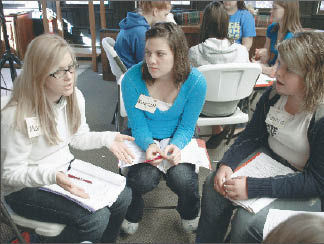 |
|
Ready to Listen: LifeSavers was formed to offer support to teens in crisis who need a sounding post.
Photo: Ted Crail |
Staff: LifeSavers has no official employees. It has three trainers, one of whom is Ashby. There are one or two adult advisers at each school.
Money: The annual budget is $35,000. Funding comes from individual donors as well as annual fundraisers, including auctions and a mystery dinner theater. An Illinois Violence Prevention Authority grant expired several years ago. The training retreats for peer counselors cost $230 per person, with schools typically paying $90 of that cost.
Results: Ashby says it has been some time since the organization conducted formal evaluations of its services. In 2003, pre- and post-service evaluations by school staff estimated that the presence of LifeSavers on campus correlated with a 42 percent decrease in physical fights on school property, a 60 percent decrease in drug and alcohol incidents, and a 50 percent decrease in “suicide incidents” (which includes attempts).
Toledo Ray
Toledo, Ohio
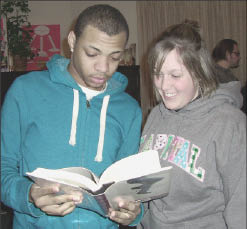 |
|
A Place of Their Own: Young people gather at Toledo Ray.
Photo: Toledo Ray |
(419) 255-7510
http://www.toledoray.org
The Strategy: Provide peer support and social networking to gay, lesbian and bisexual teens.
Getting Started: Toledo Ray began in 1997, shortly after Brenda Spurlin’s 17-year-old son came out to his parents and community, and the family had trouble finding support for gays and lesbians in the Toledo area. Except for the local PFLAG (Parents, Families and Friends of Lesbians and Gays) group, there were no opportunities for young gays and lesbians to interact or be heard. Young people at the local PFLAG said they wanted their own networking group, and Spurlin formed Toledo Ray.
How It Works: Youths meet for two hours on Wednesday nights. Initially, the local Planned Parenthood was the only group that would host their meetings; today the meetings are held at a progressive church in urban Toledo.
Each meeting begins with about 20 minutes of socializing. Then the youths come together to discuss “highs and lows”: The young people sit in a circle and talk about the best and worst things that happened to them that week. Afterward, the group often has a formal presentation or workshop led by adult volunteers on such issues as guided meditation and social activism.
Spurlin says youth participants generally select the type of programming they want to have, although at least two adult volunteers are always present to help facilitate discussions.
Youth Served: Toledo Ray estimates that it has served 1,200 gay and lesbian youths in Toledo, northwest Ohio and southeastern Michigan. Participants range in age from 13 to 19. The weekly meetings attract between eight and 32 participants.
While most of the initial participants were white youth from suburban areas, Spurlin says, Toledo Ray participants now are mostly black. She says youths from more than 60 schools are represented at Toledo Ray.
Staff: Toledo Ray has no paid staff. It is run by Spurlin and seven other adult volunteers.
Money: There is no formal budget. The group uses meeting space provided by St. Mark’s Episcopal Church, and adult volunteers typically purchase snacks for the meetings. When the group has special events, such as a gay and lesbian prom, it relies on donations from local gay and lesbian supporters. The AIDS Resource Center offers Toledo Ray free HIV testing and condoms.
Results: The group has no formal evaluations. Spurlin believes Toledo Ray’s impact is evidenced by its longevity in the community and the fact that many of its members return to volunteer or lead gay and lesbian organizations at their colleges.




































